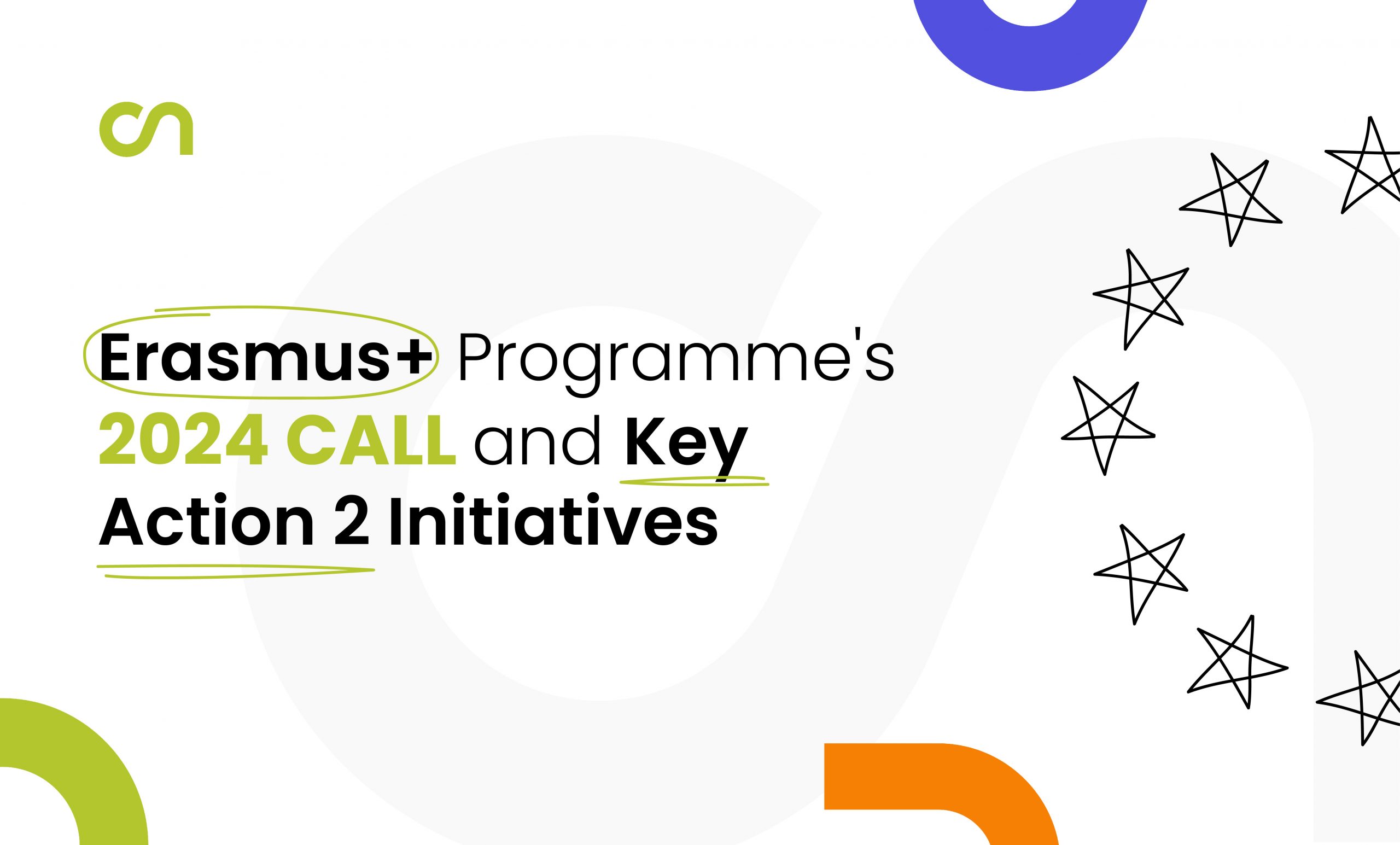
At the heart of the European Union’s commitment to foster collaboration, innovation and international mobility in the fields of education, training, youth and sport is the transformative Erasmus+ programme. At OnProjects we are experts in developing and managing projects funded under Key Action 2 (KA2) of this programme and, on the occasion of the recent publication of the new Call for Proposals, we are going to analyse the characteristics of this part of the programme for the year 2024.
Understanding what Erasmus is all about
The Erasmus+ programme, launched in 1987, has evolved into a global platform that transcends borders, connecting students, educators and organisations across the European Union and beyond. The programme is based on the conviction that mobility and collaboration are catalysts for personal growth, social development and the creation of a more interconnected Europe.
Objectives aligned with progress
At its core, Erasmus+ aims to achieve several overarching objectives, including improving skills and employability, promoting inclusion and diversity, and addressing societal challenges through innovative approaches to education and training. These objectives reflect the EU’s commitment to creating a knowledge-rich and globally competitive community.
Priorities driving progress
The Erasmus+ programme places strategic emphasis on specific priorities that match contemporary needs. From promoting digitisation and environmental sustainability to addressing social inclusion and active citizenship, these priorities serve as guiding principles, ensuring that Erasmus+ remains responsive to the evolving landscape of education and society.
Unveiling Key Action 2 (KA2)
The crux of the collaboration: KA2 unveiled
Key Action 2 is a cornerstone within the Erasmus+ framework, focusing on Cooperation for Innovation and Exchange of Good Practice. This action is instrumental in bringing together organisations and institutions to collaborate on projects that drive innovation, share expertise and foster sustainable partnerships.
KA2 Actions
Within the broad scope of KA2, several actions encapsulate the spirit of collaboration and innovation. Let us explore some of these actions and their impact on education, training and youth development.
1. Partnerships for cooperation
Partnerships bring together organisations and institutions to collaborate on projects aimed at sharing good practice, innovating and enhancing their capacities. These partnerships contribute to the development of innovative approaches, fostering a culture of continuous improvement in education and training and include:
• Cooperation Partnerships
Cooperation Partnerships, a key component of KA2, enable organisations to work together on projects that have a tangible impact on individuals and communities. These projects focus on specific themes, such as entrepreneurship education or inclusive practices, fostering collaboration at various levels.
• Small-scale partnerships
Small-scale Partnerships provide a flexible framework for smaller organisations to engage in international collaboration. These projects, although smaller in scale, have no less impact, contributing to the diversity and richness of the Erasmus+ tapestry.
The deadlines for the calls for proposals of the Cooperation Partnerships are:
5 March 2024.
1 October 2024, exclusively for Cooperation partnerships in the field of youth except for those submitted by European NGO’s and Small-scale partnerships in the fields of school education, vocational education and training, adult education and youth.
2. Partnerships for Excellence
Partnerships for Excellence raise the standard of education and training by bringing together organisations striving for excellence in their respective fields. These partnerships aim to create a culture of continuous improvement and innovation, setting benchmarks for others to follow and include:
• Centres of Vocational Excellence
Centres of Vocational Excellence focus on improving the quality, attractiveness and relevance of vocational education and training. These centres act as hubs of excellence, driving innovation and fostering collaboration between education and industry.
• Erasmus+ Teacher academies
Erasmus+ Teacher academies respond to the professional development needs of educators and trainers. By offering opportunities for international collaboration and learning, these academies contribute to the growth and expertise of those shaping the future of education.
• Erasmus Mundus Action
The Erasmus Mundus Action expands the international dimension of KA2, promoting collaboration between higher education institutions around the world. These projects encourage the exchange of knowledge, enriching the academic experience of both students and staff.
The deadlines for the calls for proposals of the Partnerships for Excellence will be:
15 February 2024 for the Erasmus Mundus Action.
7 May 2024 for Centres of Vocational Excellence.
6 June 2024 for Erasmus+ Teacher Academies.
3. Partnerships for innovation
Partnerships for innovation, which now encompass Forward Looking Projects, serve as a nerve center for projects that drive transformative change. These projects focus on innovation in education, training and youth, contributing to the broader objectives of the Erasmus+ programme. Partnerships for innovation include:
• Alliances for innovation
Alliances for Innovation aim to enhance Europe’s innovation capabilities by fostering collaboration and knowledge exchange between higher education institutions, vocational education and training providers (both upstream and downstream) and the broader socioeconomic landscape, encompassing research.
The deadlines for the calls for the Innovation Associations will be:
March 7, 2024 for Innovation Alliances.
4. Capacity building initiatives.
Capacity Building initiatives under KA2 play a key role in enhancing the capabilities of organisations and institutions beyond EU member countries. These initiatives extend to various sectors, such as youth, sports, vocational training and higher education. By fostering collaboration and knowledge sharing, Capacity Building Initiatives contribute to the overall strengthening of institutions and the improvement of education systems.
The deadlines for the calls for proposals of the Capacity Building initiatives will be:
8 February 2024 for the field of higher education.
29 February 2024 for the field of vocational education and training.
5 March 2024 for the field of sports.
6 March 2024 for the youth field.
Navigating program changes for 2024: What’s new?
1. Seniority requirement
To apply for Erasmus+ cooperative partnership projects, organisations must now be at least two years old to be eligible. This requirement guarantees a level of stability and organisational experience.
2. Limitation on the number of projects
The 2024 call introduces limitations on the number of projects in which an organisation can participate as coordinator or partner. For applications submitted to National Agencies in the fields of school education, vocational education and training, adult education and youth, the same organisation (OID) cannot participate in more than 10 applications in total per deadline, either as an applicant or as a partner. This limitation is intended to encourage access to the program by new entities.
3. Regional coherence
A notable change for Capacity Buildings in the field of VET concerns the eligibility of consortia. Interregional projects are no longer accepted, forcing consortia to choose a single region to work with. This change streamlines collaborative efforts, encouraging a more focused and region-specific approach to Capacity Development initiatives.
4. Integration of Forward Looking Projects
Forward Looking Projects, which previously constituted an independent category, are now integrated into the “Partnerships for innovation” actions. These projects will no longer be evaluated separately, so they will be more in line with the overall innovation goal of KA2. This integration represents a strategic advance towards a more cohesive and rationalised evaluation process.
It’s now time to start working!
We invite you to consult the Erasmus+ Programme reference documents for 2024:
And now, if you are interested in developing your project within the framework of the Erasmus+ programme or if you would like to find out more about any of the aspects dealt with in this article or in the reference documents, please fill in the following contact form and we will get back to you as soon as possible.
